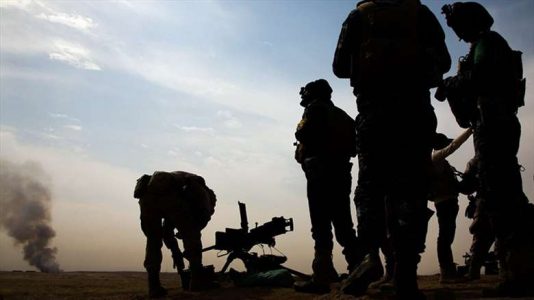
Islamic State terrorist group continues its multi-pronged attacks in Iraq for third day in a row
On Sunday night, the so-called Islamic State launched multiple assaults in different areas across central provinces of Iraq, targeting tribal Popular Mobilization Forces (PMF) and a local administrator, making it the third consecutive assault in a week.
The bloody incident comes as part of a recent increase in activity by fighters loyal to the group, over two years after its territorial defeat in Iraq in late 2017 by federal security forces, Kurdish Peshmerga, and the PMF militias, with air support by the US-led coalition.
In an ambushed attack by the Islamic State on Sunday night against the convoy of al-Azim district’s head of municipality, Mohammed Dhifan al-Obeidi, the head was critically wounded and three of his guards killed, a source told Kurdistan 24.
Following the attack, a group of tribal fighters also known as tribal PMF, organized a unit alongside the Iraqi army and police to raid the site resulting in four deaths and five injuries in renewed clashes with the Islamic State, the source said.
In parallel, an Iraqi soldier was killed in a sniper attack launched by some Islamic State members on the Naqishbandi Iraqi army base in Qara Tapa sub-district of Diyala late on Sunday, they noted.
According to local sources, Brigade-47 of the PMF was targeted in Jurf Sakhar town, located about 60 kilometers southwest of Baghdad.
Following late Sunday’s attacks, the Iraqi government announced the launch of a military operation, code-named Desert Lions, to go after the resurging Islamic State operatives in western Iraq.
Sleeper cells loyal to the organization have upped their activity in recent weeks, as a series of other crises have hit Iraq. “What’s happening now is taking us back to 2014,” Adnan Ghadban, a tribal sheikh in the city of Baquba, told AFP.
On Thursday, its fighters reportedly shut down close to 1,500 megawatts of electricity from the national grid by bombing power lines in rural Diyala province.
Top Kurdistan Region officials and Peshmerga commanders have issued repeated warnings to both the Iraqi government and the international community that the Islamic State remains active and capable of reasserting itself to continue its campaign of violence. A “security vacuum,” as KRG officials have described it, has made the disputed areas in Diyala, Salahuddin, and Kirkuk more vulnerable to Islamic State attacks.
Source: Kurdistan 24





